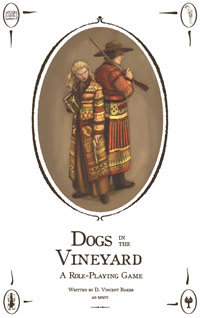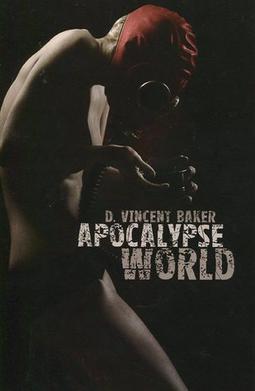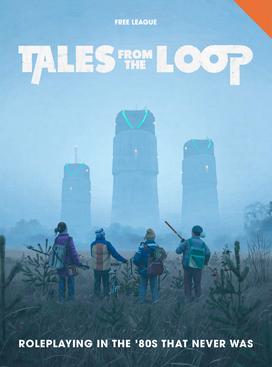
Universalis, subtitled "The Game of Unlimited Stories", is a role-playing game (RPG) published by Ramshead Publishing in 2002 that stresses interactive storytelling. The game uses a unique system, based on "coins" that are used to make additions to the game, which allows the entire group to participate in the creation of the setting and events in play without a traditional gamemaster. The rules also provide a means of negotiating their own alteration, allowing for unlimited customization for play. The system is meant to support any possible genre.
In tabletop games and video games, game mechanics specify how a game works for the players. Game mechanics include the rules or ludemes that govern and guide player actions, as well as the game's response to them. A rule is an instruction on how to play, while a ludeme is an element of play, such as the L-shaped move of the knight in chess. The interplay of various mechanics determines the game's complexity and how the players interact with the game. All games use game mechanics; however, different theories disagree about their degree of importance to a game. The process and study of game design includes efforts to develop game mechanics that engage players.

HoL is a role-playing game created by Dirt Merchant Games and produced by Black Dog Game Factory, a subsidiary of White Wolf which produced adult oriented RPGs. The HoL Core Rulebook was published in 1994, and was followed up by one other supplement Buttery Wholesomeness in 1995. Although HoL is playable, it was meant as a satire of RPGs. The pages of the books are written by hand, and the authors freely take stabs at other popular role-playing games, particularly Vampire: The Masquerade and Dungeons & Dragons, and those who play them.

Dogs in the Vineyard is an independently published role-playing game published by Lumpley Games in 2004 that is loosely based on the history of the Mormons.
In tabletop role-playing games, a plot point is a resource possessed by a player which can be spent to alter the plot of the game. The name is a pun on the TV and film term plot point.

A diceless role-playing game is a tabletop role-playing game (TTRPG) which is not based on chance because it does not use randomizers to determine the outcome of events. The style of game is known as "diceless" because most TTRPGs use dice as a randomizer. However, some games use other randomizers such as playing cards instead of dice, and these are not considered "diceless."

Fiasco is a role-playing game by Jason Morningstar, independently published by Bully Pulpit Games. It is marketed as a "GM-less game for 3–5 players, designed to be played in a few hours with six-sided dice and no preparation". It is billed as "A game of powerful ambition and poor impulse control" and "inspired by cinematic tales of small time capers gone disastrously wrong—films like Blood Simple, Fargo, The Way of the Gun, Burn After Reading, and A Simple Plan."
The Star Wars Roleplaying Game is a tabletop role-playing game set in the Star Wars universe, first published by Fantasy Flight Games in 2012. It consists of different standalone cross-compatible games where each one is a separate themed experience. The sourcebooks support games set from the Clone Wars era to the original Star Wars trilogy era; there is limited support for the Star Wars sequel trilogy era. Since 2020, the game line has been maintained by Asmodee's subsidiary Edge Studio.
Free RPG Day is an annual promotional event by the tabletop role-playing game industry. The event rules are fairly simple: participating publishers provide special free copies of games to participating game stores; the game store agrees to provide one free game to any person who requests a free game on Free RPG Day.

Apocalypse World is a post-apocalyptic indie role-playing game by D. Vincent Baker and Meguey Baker, published in 2010 with only an implied setting that is fleshed out by the players in the course of character creation. It was the game for which the Powered by the Apocalypse engine was developed. On release, Apocalypse World won the 2010 Indie RPG Award and 2011 Golden Geek RPG of the year.

Powered by the Apocalypse (PbtA) is a tabletop role-playing game design framework developed by Meguey Baker and Vincent Baker for the 2010 game Apocalypse World and later adapted for hundreds of other indie role-playing games.

Monsterhearts is an indie role-playing game about "the messy lives of teenage monsters." It was designed by Avery Alder as an adaptation of Apocalypse World. It is known for its handling of sexuality and LGBT content. It has been nominated or shortlisted for multiple awards.

Freedom: The Underground Railroad is a 2013 co-operative board game designed by Brian Mayer and published by Academy Games, their first game in the Freedom Series. The game has drawn positive attention for its approach and handling of the topic.

Breaking the Ice is an indie role-playing game by Emily Care Boss. It's a game for two players where the player characters go on three dates together to see if they will become a couple.

Deception: Murder in Hong Kong is a board game for 4 to 12 players designed by Tobey Ho and published by Grey Fox games in 2015. Set as a detective investigation scene, in Deception players find themselves in a scenario of intrigue and murder, deduction and deception. Players take on the roles of investigators attempting to solve a murder case, but one of the investigators is actually the killer. Different roles are randomly assigned at the start of play. As the investigators attempt to deduce the truth, the murderer's team must deceive and mislead.

Tales from the Loop, subtitled "Roleplaying in the '80s That Never Was", is an alternative history science fiction tabletop role-playing game published in 2017 by Free League Publishing, the international arm of Swedish game and book publisher Fria Ligan AB, and Modiphius Entertainment. The game, based on the art of Simon Stålenhag, envisions an alternative world where a group of bored and ignored preteens and teens solves mysteries caused by new technology near their hometown.

The Quiet Year is a map-drawing tabletop role-playing game published by indie game publisher Buried Without Ceremony in 2013 in which players collaboratively create maps to drive a central story of survival.
Avery Alder is a Canadian tabletop role-playing game designer. She designs games with themes of LGBTQ self-discovery, community building, and post-apocalyptic survival. In collaboration with Benjamin Rosenbaum, Alder invented the Belonging Outside Belonging system, which became a template for future designers' games. Her work is a topic of scholarship in the history of game design.

Fall of Magic is a collaborative storytelling tabletop role-playing game by Ross Cowman that is played on a hand-printed canvas map. The story follows a dying magus and companions on their journey to the birthplace of magic. The players utilize the map to track game progression as they unroll it. Fall of Magic is an entirely creator-produced indie role-playing game.

World Wide Wrestling RPG is a tabletop role-playing game about the lives of professional wrestlers both inside and outside the ring. It was written and illustrated by Nathan D. Paoletta. Gameplay focuses on the tension between wrestlers' characters as public entertainers versus their real personalities.















